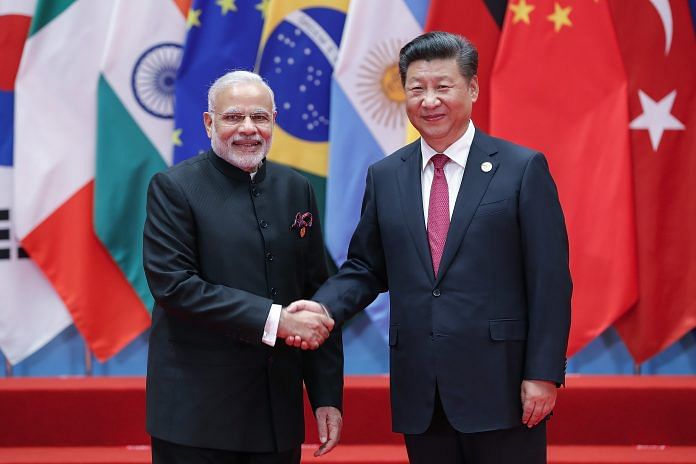While China’s Xi has resorted to an anti-corruption campaign, Japan’s Abe and Modi have switched to nationalism to retain popularity.
As we enter 2018, it is enticing to look at the current Asian order in cricketing terms. What comes to mind is the favourite Aussie tactic – sledging.
Its function is to verbally pressure the opposition in a tight situation to turn the outcome your way. Sledging without actual skill and performance is just empty shouting.
In politics, effective sledging would be to pressure the opposition or use deflationary tactics to ensure the political outcomes a leader or party desires. The chief mandate for the three big Asian leaders – Xi Jinping, Narendra Modi and Shinzo Abe – is to bring about major domestic economic transformation. But with each failing to do so, they have opted for a lot of empty sledging. This takes different forms in each country.
The Chinese problem
Xi’s core mandate is about taking the Chinese economy away from a low-cost manufacturing-led growth to a consumption-based one. But shoddy old habits remain – China’s growth of around 6 per cent is a significantly lower figure, which is still driven by old-style infrastructure investment and manufacturing. This growth model is fundamentally unsustainable, and has driven debt to dangerous levels.
If China’s goal is to replace America as the global hegemon and rewrite the world order, it is far from achieving it. Xi is gradually denouncing Deng Xiaoping’s foreign policy of “lay low and hide your strengths”. The new Chinese global economic policy with institutions like the Belt and Road Initiative will not succeed in replacing the American led-global architecture without a domestic economic transformation. A transformed and transparent Chinese economy is required to underwrite the global economy and facilitate the Renminbi as the global reserve currency. On that count, America is far safer than most analysts assume.
In the absence of actual economic outcomes, Xi’s politics has turned to empty sledging. The hallmark has been to retain popularity via the anti-corruption campaign, whereby more than 1.3 million big and small Chinese officials have been fired. But in the absence of free and non-politicised courts and police, the anti-corruption campaign is all about targeting political opponents.
The Japanese story
While the post-World War II Japanese economic transformation was no less a miracle than the Chinese one, its post-1991 slump continues. The results of Abenomics have been less than impressive. While Japan has succeeded in bringing in some structural reforms and securing trade agreements with Europe and a Trans-Pacific Partnership without the US, the crisis persists.
The core Japanese problem is its shrinking population and worsening dependency ratio. Without a strong demographic base, it’s nearly impossible for Japan to achieve the necessary aggregate consumption demand. The solution to this problem is rather simple: immigration. But the insular Japanese culture has been reluctant to absorb immigrant workers.
Again, in the absence of economic results, Abe’s politics has turned to reigniting the spirit of the late 19th century ‘Meiji Era’, whose defining slogan was “rich nation, strong army”. Trying to move away from the post-war ‘nuclear allergy’ of Japan, Abe’s politics has focussed on facilitating constitutional amendments to overturn Article 9, which ensured that Japan would not develop combative military forces and nuclear weapons.
The success of Abe’s domestic threat perception policy is evident. While his polling numbers were initially not significant, leveraging North Korea’s ICBM tests as a threat and holding snap elections made his party achieve a thumping majority.
The Indian landscape
The Indian landscape looks similar. With around a million people ready to join the workforce every month, Modi’s most important mandate was to facilitate job-creating economic growth. The Indian current youth bulge provides India with a short window to achieve middle-income status. But the economic outcomes under Modi have been less than satisfying.
While he has succeeded in bringing in reforms such as GST, near-wholesale FDI liberalisation and increased infrastructure spending, Indian industries still remain uncompetitive and beyond the global supply chains. ‘Vertically integrated supply chains’ – that combine developed world technology with developing world labour, mark manufacturing and trade today. Without the required skill development programs and major regulatory reforms, Modi has failed to provide India with a genuine 21st century economic growth model.
In the absence of economic outcomes, Modi’s politics has turned to igniting nationalism and arbitrary economic decisions such as demonetisation. It is unfortunate that Modi, plausibly India’s most skilled politician in a generation, has failed to use his political skills to facilitate reforms than can transform the sluggish Indian economy.
Srijan Shukla is a student of politics at McGill University, Montreal.




Viewed objectively, there can be no comparison between what paramount leader Deng and President Xi have contributed to China’s greatness. One man changed the lines fate had etched onto the palms of ordinary citizens. He has the stature of Mahatma Gandhi. The other simply exercises a great deal of power in a country with a GDP of more than $ 10 trillion.